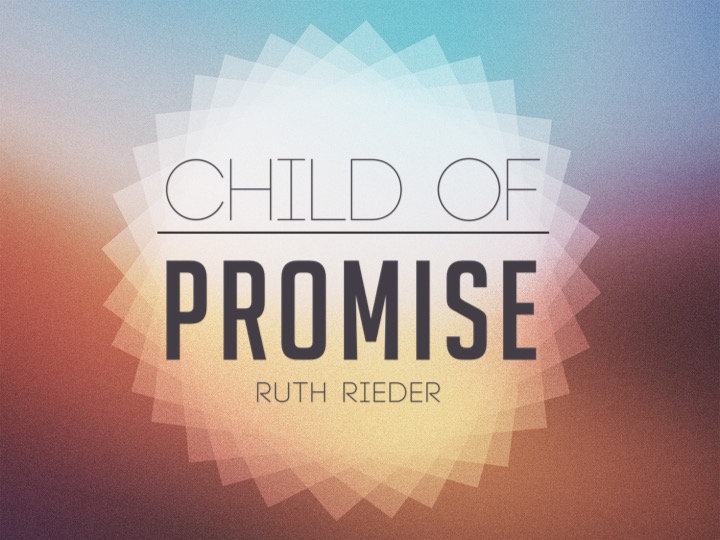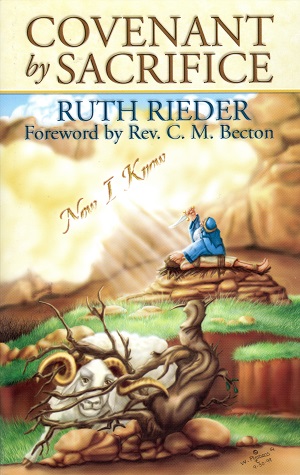
By Ruth Rieder
And the LORD visited Sarah as he had said, and the LORD did unto Sarah as he had spoken. For Sarah conceived, and bare Abraham a son in his old age, at the set time of which God had spoken to him. And Abraham called the name of his son that was born unto him, whom Sarah bare to him, Isaac.”
Disbelieving laughter resounded from the lips of Abraham when God told him of the impending birth. In response God chose the name for the miracle child—Isaac, meaning laughter. Sarah also laughed incredulously within herself upon learning of the promised son. Abraham laughed, Sarah laughed, but now God had the last laugh as the elderly couple held the tangible evidence of God’s laughter in their arms—Isaac, child of promise. “And Sarah said, God bath made me to laugh, so that all that hear will laugh with me.”2
“And Abraham circumcised his son Isaac being eight days old, as God had commanded him. And Abraham was an hundred years old, when his son Isaac was born unto him. . . . And the child grew, and was weaned: and Abraham made a great feast the same day that Isaac was weaned.” 3 Joyous celebration reverberated through the household of Abraham and Sarah. However, an undercurrent of trouble was brewing in the midst of the gaiety. Before the day ended, Abraham would be called on to make yet another sacrifice.
“And Sarah saw the son of Hagar the Egyptian, which she had born unto Abraham, mocking.”‘ Hostility welled up in Ishmael’s heart because of the intrusion of this “new” son. Bursting forth in mocking contempt, he began making fun of Isaac. As he did, the wrath of Sarah was kindled and she entreated Abraham to send away the bondwoman and her son. Years of contention finally demanded a response.
“Wherefore she said unto Abraham, Cast out this bondwoman and her son: for the son of this bondwoman shall not be heir with my son, even with Isaac.
A sudden pall descended over the feast as Abraham’s heart grieved over Sarah’s request. “And the thing was very grievous in Abraham’s sight because of his son.” 6 The merriment of the moment began to diminish as one by one the guests departed, leaving Abraham with a momentous decision to make. What should he do? He loved Isaac with a depth of love he had never before realized or thought possible. Yet on the other hand, he dearly cherished his firstborn son, Ishmael. His heart felt as if it was being torn into a million pieces. Why must life be so complicated?
As Abraham’s mind whirled in circles, he heard the familiar voice of the Almighty. “And God said unto Abraham, Let it not be grievous in thy sight because of the lad, and because of thy bondwoman; in all that Sarah hath said unto thee, hearken unto her voice; for in Isaac shall thy seed be called.”‘
Once more the broken man of God traversed the difficult road of consecration. “And Abraham rose up early in the morning, and took bread, and a bottle of water, and give it unto Hagar, putting it on her shoulder, and the child, and sent her away: and she departed, and wandered in the wilderness of Beersheba.”8 Giving bread and water to Hagar, the old patriarch drew Ishmael to him one last time as their tears of suffering mingled together. Then somehow Hagar found the courage to begin the trek away from the only home Ishmael had ever known.
Watching Ishmael walk away, Abraham felt as if his heart would break. As he gazed into the distance, Ishmael and Hagar grew smaller and smaller until finally they were lost from view. Even though the pain of Ishmael’s absence continued to haunt Abraham, he obeyed the voice of God.
“For it is written, that Abraham had two sons, the one by a bondmaid, the other by a freewoman. But he who was of the bondwoman was born after the flesh; but he of the freewoman was by promise. Which things are an allegory.”9 The sons of Abraham represent two religious groups—one born of the flesh, the other born of the Spirit.
Born of a bondwoman after the flesh, Ishmael could boast nothing miraculous of his birth. It was the result of human impatience and resourcefulness. When God chose not to operate according to man’s time clock, they tried to help Him by producing their own solution.
Egypt’s son was a half-breed—right father, wrong mother. It mattered who his mother was because his mother would choose his wife. “And his mother took him a wife out of the land of Egypt.”10 Hagar chose a woman just like herself for her son—she chose another Egyptian.
There is a religious group born after the flesh with nothing miraculous in their spiritual birth. Eagerly “accepting Christ as personal savior,” their “salvation plan” is a product of human ingenuity. Why should they wait for the “promise of the Father” when a humanistic solution can be manufactured? That outdated promise is no longer in operation today, or so they say. The mother of this half-breed church is an Egyptian bondmaid. Using the Word of God and professing to know Him, they continue living like Egypt and partake of its merchandise. While promising liberty, they are entangled with the beggarly elements of the world, “which gendereth to bondage, which is Agar.”11
“But Jerusalem which is above is free, which is the mother of us all. For it is written, Rejoice, thou barren that bearest not; break forth and cry, thou that travailest not: for the desolate hath many more children than she which hath an husband. NOW WE, BRETHREN, AS ISAAC WAS, ARE THE CHILDREN OF PROMISE”! 12
Born of a miraculous birth, Isaac was God’s will in human form, an ever present reminder of the intangible presence of the Creator. No greater manifestation of the reality of God could have been asked for. This child embodied the earnest of the inheritance that was to come—seed like the sands of the seashore and stars in the sky.
What a beautiful picture of redemption’s plan is portrayed in this supernatural birth. We were dead in trespasses and sins, “having no hope, and without God in this world.” 13 But in His due time resurrection power flowed through us and brought forth the miracle of the new birth. We have received the precious promise of the Father, “which is Christ in you, the hope of glory.” 14
Our mother is Jerusalem, the true church. Born of the Spirit, the offspring of liberty, we have been set free from the bondage of Egypt. “Wherefore thou art no more a servant, but a son; and if a son, then an heir of God through Christ.” 15
By miraculous means we became children of promise when “God . . . sent forth the Spirit of his Son into your hearts, crying, Abba, Father.’ The Holy Ghost is a continual reminder of the invisible God. It is the earnest of our inheritance—eternal life.
“Now he which stablisheth us with you in Christ, and hath anointed us, is God; who hath also sealed us, and given the earnest of the
Spirit in our hearts” (II Corinthians 1:21-22).
“Now he that hath wrought us for the selfsame thing is God, who also hath given unto us the earnest of the Spirit” (II Corinthians 5:5).
“In whom ye also trusted, after that ye heard the word of truth, the gospel of your salvation: in whom also after that ye believed, ye were sealed with that holy Spirit of promise, which is the earnest of our inheritance until the redemption of the purchased possession, unto the praise of his glory” (Ephesians 1:13:14).
“But as then he that was born after the flesh persecuted him that was born after the Spirit, even so it is now.”” Just as Ishmael persecuted Isaac, the world church persecutes the true church. Labeling us a cult or people in bondage, they actually proclaim a false message and are held captive by their own fleshly lusts.
Let us never become intimidated or compromise our One God, apostolic message. “We, brethren, as Isaac was, are the children of promise.”‘ The inheritance belongs to us! Why are we going to Ishmael, the Spirit in our hearts” (II Corinthians 1:21-22).
“Now he that hath wrought us for the selfsame thing is God, who also hath given unto us the earnest of the Spirit” (II Corinthians 5:5).
“In whom ye also trusted, after that ye heard the word of truth, the gospel of your salvation: in whom also after that ye believed, ye were sealed with that holy Spirit of promise, which is the earnest of our inheritance until the redemption of the purchased possession, unto the praise of his glory” (Ephesians 1:13:14).
“But as then he that was born after the flesh persecuted him that was born after the Spirit, even so it is now.” Just as Ishmael persecuted Isaac, the world church persecutes the true church. Labeling us a cult or people in bondage, they actually proclaim a false message and are held captive by their own fleshly lusts.
Let us never become intimidated or compromise our One God, apostolic message. “We, brethren, as Isaac was, are the children of promise.”‘ The inheritance belongs to us! Why are we going to Ishmael, the world church, seeking ways to claim our inheritance? Crowding their facilities full of people seeking an easy path, they are nothing more than a product of human ingenuity. The Lord does not desire a worldly crowd but a sanctified church. They cannot teach us how to build churches! Only God can build His church! “Up on this rock I will build my church; and the gates of hell shall not prevail against it.”19
“Nevertheless what saith the scripture? Cast out the bondwoman and her son: for the son of the bondwoman shall not be heir with the son of the free-woman.”‘ It is time to cast Egypt out of our midst. We do not need Egypt’s ways or methods! The early church turned the world upside down through prayer, fasting, miracles, signs, wonders, and preaching the Word. They did not need slick packaging and marketing techniques. Herein lies the secret to their success: “And they went forth, and preached everywhere, the Lord working with them, and confirming the word with signs following. Amen. “21 If it worked back then, it will still work today because Jesus Christ is “the same yesterday, and today, and forever.”22
Compromising our message of holiness and flooding our churches with worldliness will never enable us to claim our inheritance! It will cause us to lose our birthright. As the children of Israel prepared to pass through the waters of the Red Sea, Moses made a profound statement of faith. “And Moses said unto the people, Fear ye not, stand still, and see the salvation of the LORD, which he will skew to you today: for the Egyptians whom ye have seen today, ye shall see them again no more forever.” 23 When we pass through the waters of baptism, the Egyptians that held us captives are drowned in the sea of forgetfulness. The world and all its lusts are left behind. We must never invite Egypt back into our lives!
There is no place for Egypt in God’s kingdom. Egypt’s son shall never be heir with the child of promise. “So then, brethren, we are not children of the bondwoman, but of the free. ”24 Don’t ever get a case of mistaken identity and forget who we are:
NOW WE, BRETHREN, AS ISAAC WAS, ARE THE CHILDREN OF PROMISE!
Footnotes:
- Genesis 21:1-3
- Genesis 21:6
- Genesis 21:4-5, 8
- Genesis 21:9
- Genesis 21:10
- Genesis 21:11
- Genesis 21:12
- Genesis 21:14
- Galatians 4:22-24
- Genesis 21:21
- Galatians 4:24
- Galatians 4:26-28
- Ephesians 2:12
- Colossians 1:27
- Galatians 4:7
- Galatians 4:6
- Galatians 4:29
- Galatians 4:28
- Matthew 16:18
- Galatians 4:30
- Mark 16:20
- Hebrews 13:8
- Exodus 14:13
- Galatians 4:31
The above article, “Child of Promise” was written by Ruth Rieder. The article was excerpted from chapter nine in Rieder’s book Covenant by Sacrifice.
The material is copyrighted and should not be reprinted under any other name or author. However, this material may be freely used for personal study or research purposes.




1 thought on “Child of Promise (Entire Article)”
Comments are closed.